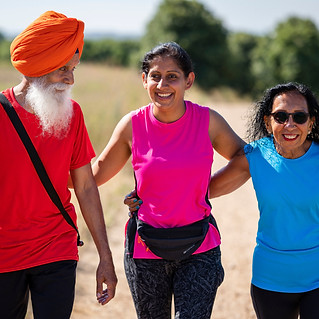
Loneliness and disability
How to manage feelings of loneliness
We all feel lonely at times – it’s a natural human emotion. We're biologically wired for social contact, and loneliness is our signal that we need more. Most of us will experience loneliness at some point in our lives, regardless of age, circumstance and background. We all experience loneliness differently. It's important to remember that some people are at a higher risk than others.
Recent research has shown that disabled people in the UK are more likely to feel substantially lonely (25%), compared to adults with no disability (6%). In 2021, research by the disability charity Sense showed that nearly two-thirds (61%) of disabled people were chronically lonely, and this was even higher (70%) for young disabled people. So not only are this group more likely to feel lonely, they are also more at risk of experiencing chronic loneliness – which means that someone feels lonely often or always.
Supporter of Marmalade Trust, Lucy, is a wheelchair user. She also has 10 years of experience working with disability organisations. Below, Lucy shares her ideas and tips on what to consider and how to make new connections for disabled people with mobility difficulties, although many of these tips are also relevant for people with other disabilities.
People with mobility difficulties face similar challenges, for example, with accessibility and a lack of understanding or awareness from others about specific needs. However, there are ways to overcome these barriers, which can, in the long term, help you feel more included and able to access the social connections you need.
Get support from organisations or healthcare professionals
Get help you access appropriate assistive technology - like wheelchairs and hearing aids - to help you participate in the social connection you want. A good starting point is contacting your GP or specialist disability charities like Sense.
Plan ahead
Transport and access can be a challenge for anyone with a disability seeking social contact: so, it is important to plan ahead. You can do this by finding out if venues are accessible (with ramps or a hearing loop) and by making people aware of your needs. Also look at the various transport options available to you.
-
Train: You can book assistance in advance (e.g., to put a ramp down or to guide you to your seat).
-
Bus: Most buses now have ramps, and you can apply for a bus pass for free bus travel.
-
Community transport: Look at local community transport options like Dial a Ride Bristol which have accessible vehicles.
Talk about your experience of loneliness
Sharing your story can be a positive first step to helping others become aware of how you feel and the barriers you might face to accessing social connection.
Activities and ideas for making connections
It’s important to work out what type of social connections you need. There are so many opportunities available – it’s about finding what’s right for you.
For people who struggle to get out and about or just prefer to stay in, consider:
-
Online groups or forums – join online seated yoga with Choice International, join a shared interest group or try out online events on Mirthy like laughter yoga or cooking workshops. Barclays and Age UK also offer sessions to build your confidence online.
-
Telephone groups & activities – Age UK Bristol has a telephone group connecting people over 50.
-
Audio books – Listening Books has a service which sends a free tablet with 50 audio books – you could start up a reading group online or over the phone.
For people who are keen to be active and who have an adventurous side:
-
Take part in sport – sport is a great way to make new connections. It can help build confidence, self-esteem and improve your health and wellbeing. Look at the Paralympic website to get ideas of where to start – from wheelchair tennis to alpine skiing – find out what’s right for you and join a club to get started.
-
Go on extreme adventures - check out outdoor activities tailored for disabled people with organisations like Access Adventures and the Calvert Trust.
-
Learn or do something new - it’s great to challenge yourself. This could be discovering your inner artist, learning a new language or volunteering with an organisation that you love.
The possibilities are endless - find what’s right for you.
.png)



.jpg)